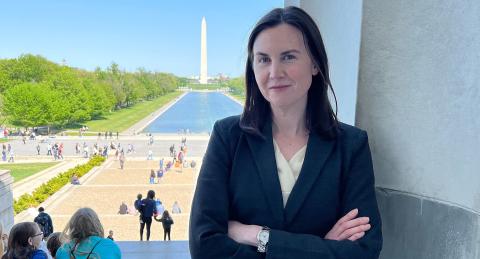
Describe what you are currently doing for work and your path.
I am a researcher at the UNH Institute on Disability (IOD), where I have been since 2017. When I came to the Ph.D. program in sociology, I had already been working in research for several years, doing survey production (large scale data collection) and data analysis. While I was a graduate student, I had the opportunity to teach as well as work on a variety of other data collection efforts. I really enjoyed both teaching and research, but I think my heart was always in research, so I was excited to settle into my current position and do research full-time. My work is grant-funded, so I spend some of my time writing grant applications, some of my time doing data analysis, and some of my time writing and disseminating findings. My team at the IOD, the Center for Research on Disability, is truly interdisciplinary. A lot of good comes from pulling input from my coworkers who have degrees in public policy, psychology, economics and epidemiology. It also really allows me to see the unique perspective that I can offer with a background in sociology.
How did your education in your program prepare you for success?
I came to the Ph.D. program with a good amount of experience carrying out other people’s research. In that respect, I felt equipped to handle the logistics and administration that comes with managing a project. But what the sociology program provided was a strong theoretical foundation for developing my own research agenda. As someone who loves methods and analysis, I really needed help with figuring out the context that helps to situate what I’m doing relative to other researchers and all of those who have come before me. I also liked how the label of “student” gave me a shield of sorts to let others know I’m in training, still learning. Being a student means asking a lot of questions and that’s something I’ve learned never ends. Finishing a terminal degree does not mean your learning is over. It just means you’re now responsible for knowing when to ask questions, what to read, and where to seek further training.
What person or course most influenced you while at UNH?
I was fortunate to have the opportunity to work with so many of the faculty in the sociology department during my tenure as a student. Picking a favorite class or professor feels a bit like picking a favorite child. However, I have to acknowledge my patient advisor, Dr. Safford. We linked up due to a common research interest and ended up working together for a few years. When my dissertation progress lagged due to personal circumstances, he made sure I didn’t jump ship. He provided the support I needed to stay connected to my project and to the department and he treated me like a true colleague. I needed this to get across the finish line and to make the shift from ABD to Ph.D.
What advice do you have for students interested in your field?
Graduate school can be arduous but it’s important to focus on what you love about it when thinking about your career. It can be easy to be swayed by the expectations of others or the accomplishments of other students. Identify what you enjoy doing and ask lots of questions. Many people get connected to their dream job (or dream job steppingstone) through their networks or their advisor’s networks (hat tip to Granovetter here). Talk about your career and research interests with your advisors, faculty in and out of the department, and fellow students. Talk about it with people you meet at conferences. This was something I felt reluctant to do because I was afraid of disappointing people by not planning for a tenure-track teaching position. Each graduate needs to identify the path that is right for them. There are many opportunities both inside and outside of academia for sociologists who want to do research. For those interested in a career in research, I would recommend reaching out to department alum who are working in government, academia, and at think tanks in order to learn about how different these environments are.
Anything else you'd like to share?
Doing social science research on disability is incredibly rewarding. The subject can be methodologically complex and there are many intersectional issues to investigate when examining policies, access to resources, and economic opportunities. The field is truly interdisciplinary, but I find that a sociological perspective is an asset in this work. I would encourage anyone interested in this field to reach out to chat.